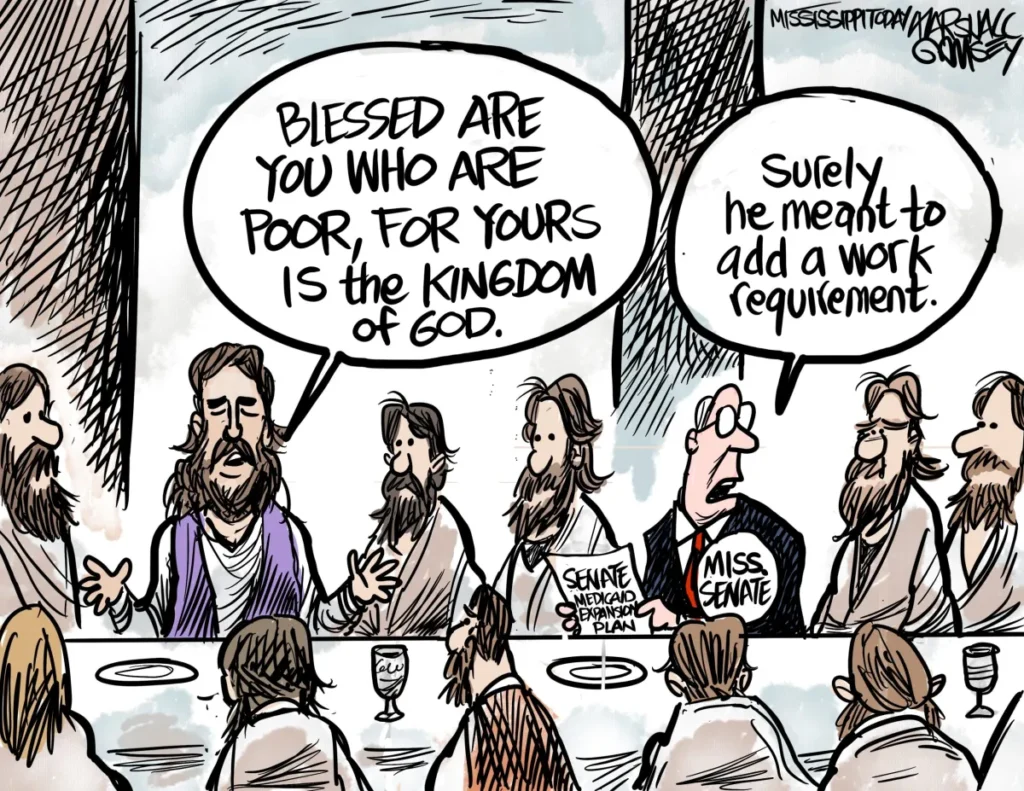
Jesus is not a political weapon to be turned on our political enemies and Scripture does not exist to be twisted to fit our political agenda.
This week is Holy Week for Christians — the most sacred week of the year for people who believe that Jesus Christ came to this earth as the Son of God, was crucified, and resurrected to cover the sins of man, as many Mississippians do.
Marshall Ramsey thought it was a good time to turn one of the central events of Holy Week — the Last Supper — into a Medicaid expansion pitch. The cartoon recontextualizes a verse of Scripture and suggests that the Mississippi’s Senate support of a work requirement for Medicaid expansion is in conflict with Jesus’ teachings.

I do not conclusively know what Jesus would think of Medicaid expansion. Neither does Ramsey. But that’s precisely what makes the cartoon distasteful this Holy Week. It imposes upon Jesus Ramsey’s and his employer’s political agenda, while casting an indictment on the Christianity of anyone who disagrees with them — without regard for the scriptural accuracy of its message.
There are, in fact, verses that create doubt as to the scriptural accuracy of the cartoon’s message. For instance, the Apostle Paul writing to the 1st Century church in Thessalonica said, “For even when we were with you, we gave you this rule: ‘The one who is unwilling to work shall not eat.’ We hear that some among you are idle and disruptive…Such people we command and urge in the Lord Jesus Christ to settle down and earn the food they eat.” 2 Thessalonians 3:10-12.
There are also real questions about how people interpret Jesus’ teachings on the poor. The passage from whence the cartoon’s Jesus quote comes, Luke 6:20-23, was encouragement directed specifically to Jesus’ disciples. Jesus tells them if they are poor, hungry, mournful, despised or rejected on His account, they shall have an eternal reward in heaven.
Other verses of Scripture, of course, involve actual instruction from Jesus to His followers to tend to the poor. Among them, and most frequently cited by advocates for more expansive government intervention, is a passage in Matthew (Matthew 25:31-46) that directs Jesus’ followers to look after the poor.
But Jesus’ instructions to His disciples were always personal. There was never a “run off and establish a government bureaucracy to feed the poor” sermon delivered. There were no endorsements of a specific government policy, or any statements on the efficacy of particular government programs to help the poor. He was saying, “hey Joe, if you see someone hungry or in need, help them.” In other words, a voluntary act sprung out of love, not the delegation of a duty to government.
Does this mean categorically that Jesus would oppose Medicaid expansion? No. It just means people who are saying categorically that He would support it are taking liberties with Scripture. Drawn to its logical conclusion, Ramsey’s message is that any policy that purports to help the poor, no matter its design, its cost, or the outcomes it generates, should be supported lest one come into conflict with Jesus. Pardon the pun, that’s cartoonish.
In some ways, the Apostle Paul’s instructions to the church at Thessalonica were less personal than Jesus’ message. Paul was speaking to social norms that should guide the way communities work.
Does Paul’s “those who will not work shall not eat” admonition mean the Senate should pass a work requirement? Not necessarily. It just means that there is nothing overtly unbiblical about the concept of requiring able-bodied people to work in exchange for a benefit.
I realize Ramsey is not a pastor. And I realize that cartoons are satirical, pithy, and not a medium for deep analysis. But the goal of the Last Supper cartoon was to shame Christians who disagree with him on a matter of public policy, and the predicate for the shaming was the contortion of Scripture.
Jesus is not a political weapon to be turned on our political enemies and Scripture does not exist to be twisted to fit our political agenda.











